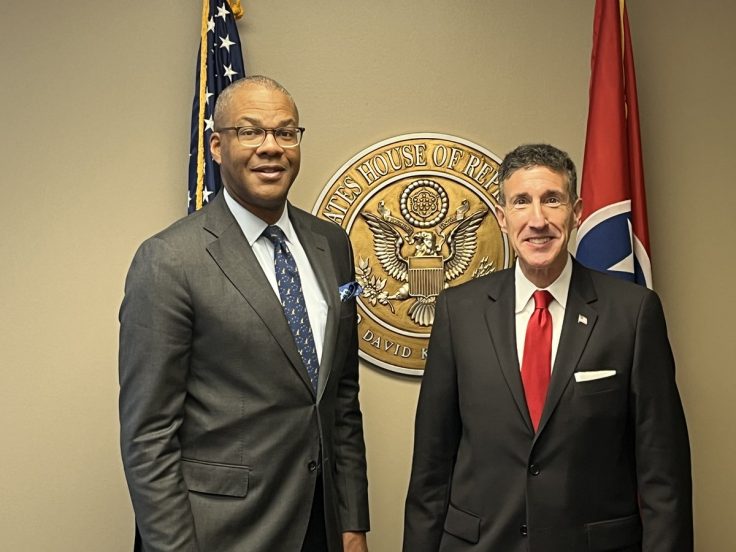Energy Secretary Jennifer Granholm has a new adviser: Ford's top electric vehicle lobbyist, who has defended the auto giant's use of taxpayer funds to build batteries with Chinese technology.
Granholm earlier this month tapped Ford lobbyist Christopher Smith to serve on her Secretary of Energy Advisory Board, which guides Granholm on how best to achieve a "global clean energy revolution." As Ford's chief government affairs officer—a role Smith will keep while serving on the board—Smith has lobbied an array of federal entities on green policies. Ford's most recent disclosure, for example, shows that Smith lobbied the Energy Department on electric vehicles and greenhouse gas emission regulations just days before Granholm announced his status as an advisory board member.
Smith's inclusion on the board comes as Ford attempts to fend off congressional scrutiny of its partnership with a Chinese battery maker. The company in February announced its plan to open a multibillion-dollar battery factory in Michigan alongside Chinese manufacturer Contemporary Amperex Technology Co., Limited (CATL), which will provide technology, equipment, and workers to help build and run the factory. Ford says it will use the factory to receive lucrative subsidies and tax breaks under President Joe Biden's so-called Inflation Reduction Act, despite provisions in the massive climate package aimed at preventing China from receiving funds.
After congressional Republicans attacked Ford's taxpayer-funded Chinese partnership, the auto giant deployed Smith to defend the arrangement. In a March 6 op-ed, Smith said Ford's Chinese partners will have no "control of the plant" and will not directly receive taxpayer funds. But Ford itself has admitted that CATL will provide personnel "to help with operations," and any federal subsidies Ford receives through the plant will no doubt help the company pay to license its Chinese partner's technology.
While Smith's explanation seems to have satisfied Granholm, it has not pleased top China hawks on the Hill. Days after Smith's op-ed, Florida Republican senator Marco Rubio introduced legislation aimed at barring Ford from using taxpayer funds to build batteries with Chinese technology.
"Without additional restrictions, Chinese companies will benefit from the subsidies President Joe Biden claimed would spur domestic manufacturing," Rubio said. "Hard-working Americans should not be forced to subsidize Chinese companies that make batteries for electric vehicles that cost more than most people make in a year."
The Energy Department did not return a request for comment. Ford told the Washington Free Beacon that the Biden administration is "aware" of Smith's lobbying work. The company also claimed it does not have a "partnership" with CATL, given that its deal with the Chinese battery maker does not give it direct ownership in the Michigan factory. That structure, congressional Republicans have argued, is meant to exploit a loophole that allows Ford to receive taxpayer funds while still taking advantage of Chinese manufacturing.
During his first month in office, Biden issued an executive order aimed at curbing the "revolving door" between government and corporate interests. Under the order, former lobbyists who are appointed to serve in the administration must wait two years before they can work on issues they lobbied on in the past. But Smith will continue to manage Ford's government affairs while simultaneously advising Granholm, an arrangement that marks an "obvious conflict of interest," according to Foundation for Accountability and Civic Trust executive director Kendra Arnold.
"In this case, there's an incentive for [Smith] to advise on issues based upon what's profitable for his company, not what's best for the American public," Arnold said. "It's essentially like giving a corporation an open avenue to lobby."
Beyond his ethics pledge, Biden has placed climate change at the center of his administration, committing hundreds of billions of dollars to fight what he calls the "climate crisis" and usher in a "green energy economy." China's iron grip on the green energy supply chain, however, has plagued that effort. China made about 75 percent of the world's lithium batteries in 2021, prompting Ford to acknowledge that it must partner with the communist nation to "build more EVs faster."
Ford's Chinese partner, CATL, is one the primary drivers of China's green energy dominance. The company has led the global electric vehicle battery market for six years in a row, a market position it owes in part to China's communist government. China has over the years showered the company with investments, subsidies, and favorable regulations, and CATL's CEO, Robin Zeng Yuqun, also served on a Chinese Communist Party advisory committee.
Biden has promised that his Inflation Reduction Act, which includes $370 billion in climate spending, would help the United States "compete" with companies like CATL, not help those companies gain a foothold in the U.S. market. The law includes provisions that bar auto manufacturers from receiving tax credits if their vehicles contain battery components that were manufactured by a "foreign entity of concern," including China. But Ford seems to have found a way around that provision by structuring its deal as a licensing agreement rather than a joint venture, meaning the company's Chinese partner does not have direct ownership. For Missouri Republican congressman Jason Smith, that structure "appears to leverage a loophole in the IRA rules."
"I am alarmed about how Ford has structured this project in the context of the IRA's clean vehicle credits and am concerned that other automakers may seek to use loopholes in the IRA to avoid guardrails meant to protect American enterprise and workers," the congressman wrote in an April 17 letter to Ford. "Ford's announcement that it will build the plant in Michigan with the help of CATL has not alleviated those concerns."
Updated 4/26, 11:31 a.m. to include comment from Ford.
